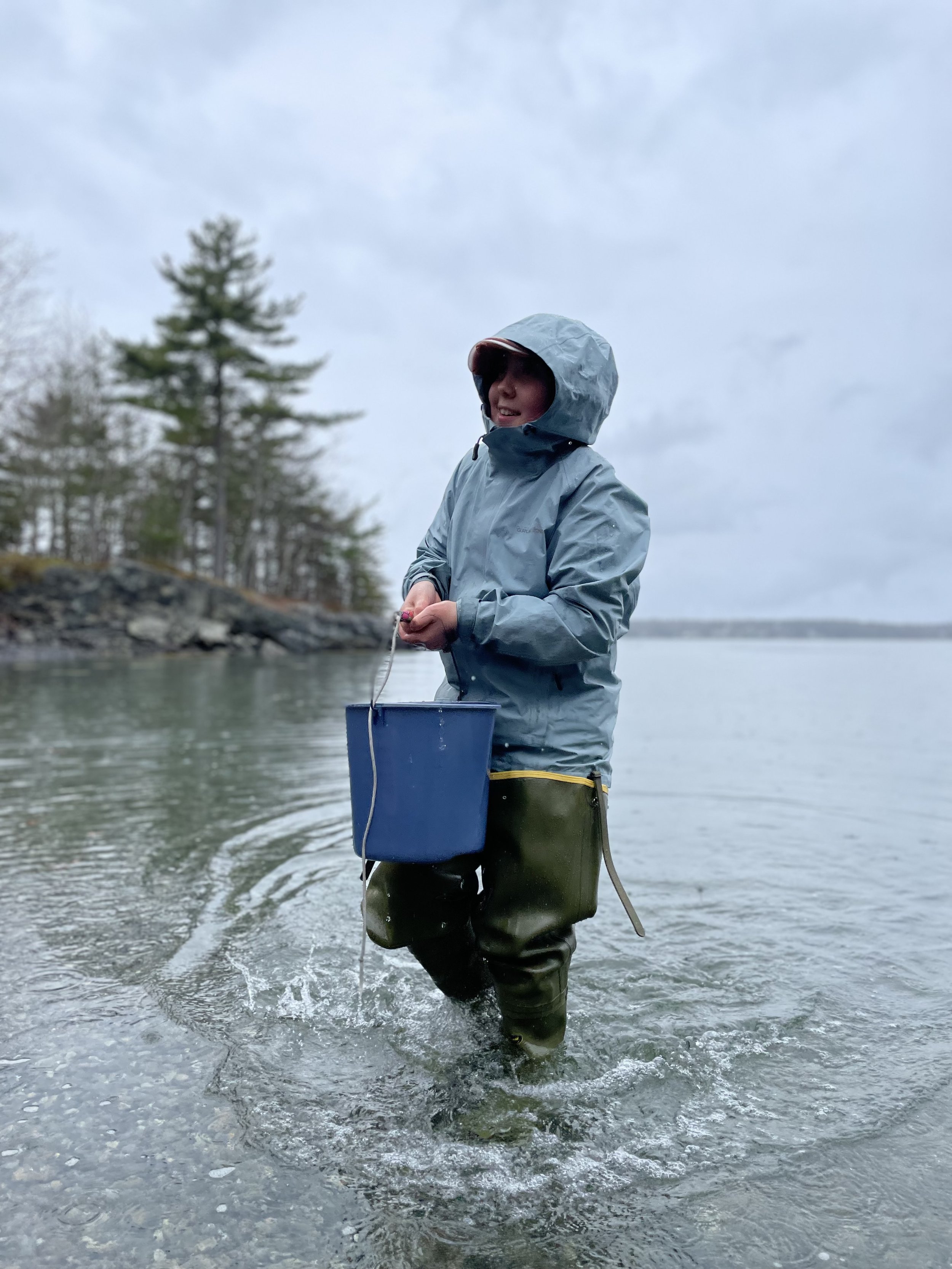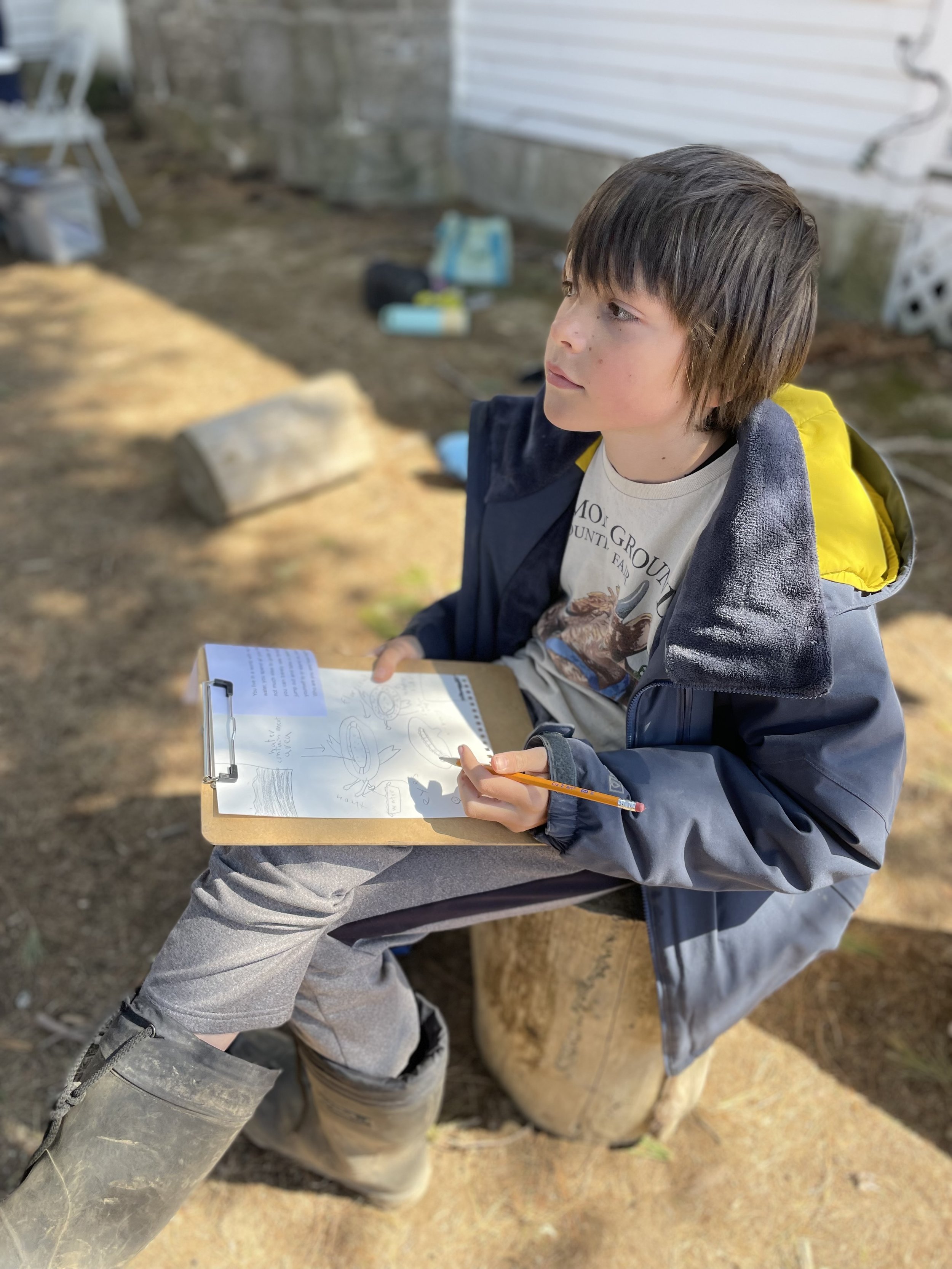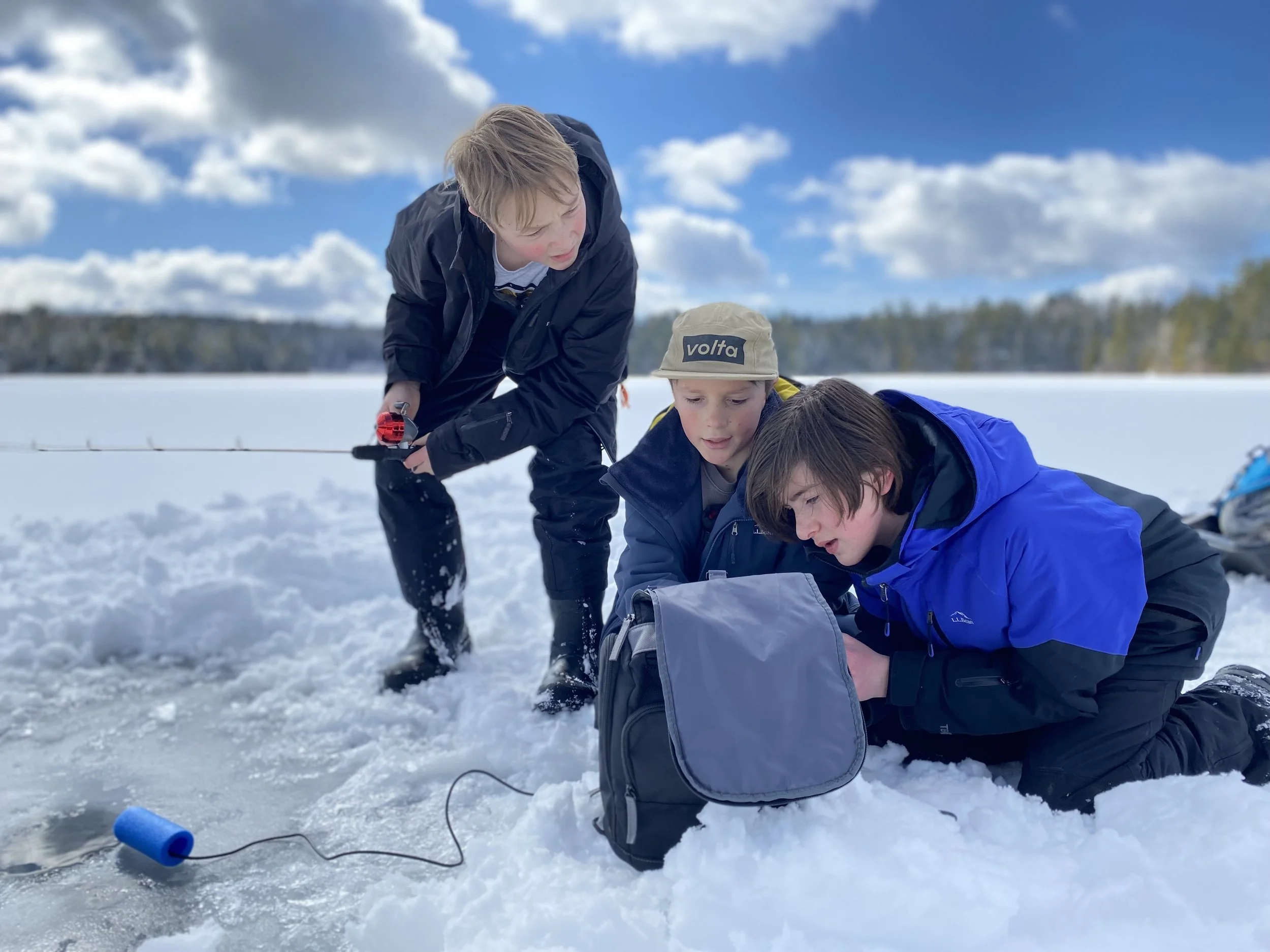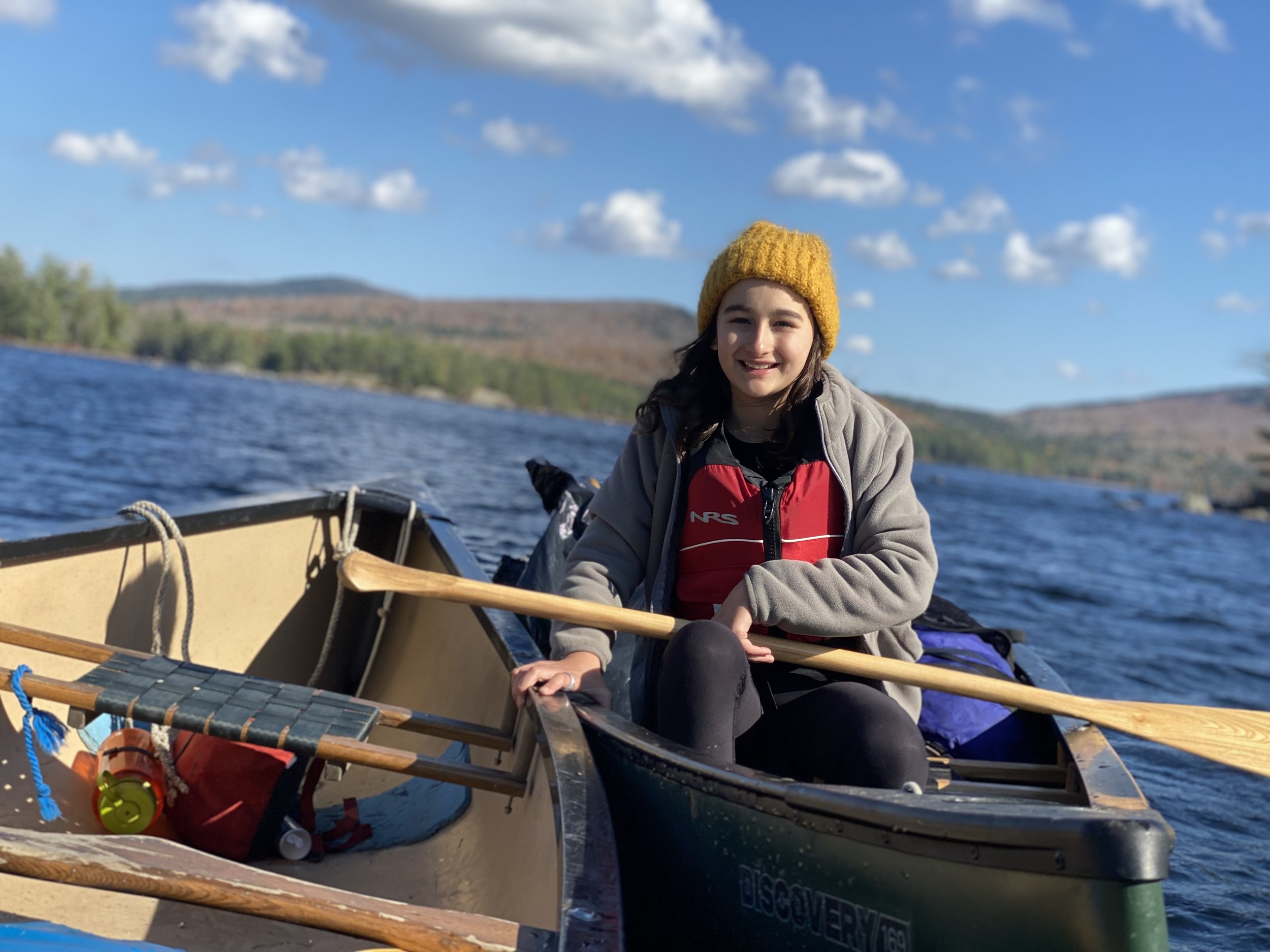Grades 1 - 8 Curriculum
WOODLAND (GRADES 1 - 2)
From the soft forest floor to its dynamic canopy, Mount Desert Island’s dense spruce-fir woodlands are a lively and welcoming place. Their namesake Woodland classroom is where students build foundational skills and foster love for learning through curiosity, wonder, and enthusiastic exploration.
Academic workshops in the Woodland classroom build a solid foundation of knowledge that will carry students through the Intertidal and Alpine classrooms. Woodlands explore multiple lenses of self, place, and community in Expedition, where themes range from Birds, Flight, and Feathers to a study of Wabanaki culture in People of the Dawn. Students venture beyond the classroom and meet community members, to better understand their roles in the wider community. Each Expedition ends with a Final Project; for example, developing a portrait of a member of our community, or publishing a Field Guide of Native Maine Birds.
During Math Workshop, Woodlands develop understanding of how numbers relate to each other, working on subjects such as place value, addition, subtraction, multiplication, and division. They explore strategies to solve math equations and are encouraged to share these skills, which helps build a deeper understanding and more substantial foundation. Eureka Math is the basis of our math curriculum throughout the grades.
The focus of English Language Arts Workshop is to build tools and skills to become successful readers and writers. It is also a time of strengthening phonetic knowledge and improving their handwriting. Students practice these skills in writing exercises, with topics ranging from poetry to opinion writing and short narratives, and are encouraged to build reading skills both independently and collaboratively. Woodlands discover their love of reading and writing through independent library choice time and and a daily classroom read-aloud.
INTERTIDAL (GRADES 3 - 5)
Maine’s rocky intertidal zone is the spirited collision of land and sea – a place of transitions, budding resilience, and exciting new encounters. As students transition into the Intertidal classroom, they begin to explore topics on ethics, social justice, and identity. From hands-on experiences, role playing, classroom discussions, and audio-visual material, Intertidals begin to develop their own moral compass. Social-emotionally, we center our work on emotional awareness and management as well as self-advocacy and problem-solving.
In the natural sciences component of Expedition, Intertidals learn about natural habitats and their trophic relationships, animal and plant adaptations, simple mechanics, and the creation of the universe. In the social studies realm, students tackle democracy as a governing system, investigate historical legacies, practice action and advocacy, and examine resilience at different scales. Through the different units, our class engages in a process of outward self-reflection; by deepening their understanding of themselves, students explore how their identity affects their interactions with the community and the world.
In Math Workshop, small-group learning promotes grade-appropriate study from multi-digit addition and subtraction to decimals and fraction operations. Through the different topics covered, Intertidals learn to decode and understand mathematical thinking. Using word-problems and pictorial modeling, students solidify their translation skills from verbal to mathematical notation in order to accurately contextualize situations into solvable problems. During Application Days at the end of each module, students utilize their newly-acquired skills and knowledge to deepen their understanding of real-world topics found around our classroom, our campus, our community, and our world. Through our Math Workshop model, students strive to become critical thinkers and problem solvers.
In the English Language Arts Workshop, Intertidals build on skills developed in the Woodland Class to grow into critical readers and writers of texts, applying those skills to texts they encounter in other contexts. Students select books across the genres and engage in writing projects from a student newspaper to graphic novels. A balance of independent work time with one-on-one conferences helps students utilize the resources around them to problem-solve and fulfill their self-determined goals. End-of-unit projects are student-initiated and followed by a presentation or celebration when completed. Daily read-aloud time allows students to engage as a community with social justice topics and issues that connect with our morning meeting material. Throughout ELA Workshop, students come to understand that reading, writing and discussion are all sides of the same coin.
ALPINE (GRADES 6 - 8)
Maine’s mountaintops are sites of broad vision and perspective, where new challenges make way for triumphant achievements. Real-world impacts are measured and realized at the Alpine zone, where students are empowered to become active stewards of our school and community. Alpines take on leadership roles on campus to mentor younger students, collaborate as a group on outdoor excursions, and embark on inquiry-based and self-directed learning.
In English Language Arts Workshop, Alpines complete several sustained writing projects with peer review and self-assessment, including literary essays, argument and analysis, dystopian fiction, epics and classics, poetry, and informational writing. Alpines grow into confident readers and writers, acquiring robust habits of work and discernment from pre-writing to revision.
During Math Workshop, Alpines solve more complex problems and begin learning pre-algebra, building knowledge of integers and functions, basic algebraic operations, rates and ratios. Our practical applications include constructing a sundial on campus, developing models to predict alewife migration, and delighting in the chemistry of culinary arts and measurement.
In Expedition, Alpines explore the intersections of science, art, and culture from ancient civilizations to contemporary global politics. Life and earth sciences, food systems and social geography, and governance and social activism are all lenses through which students develop their identities and build knowledge that affirms their sense of place and belonging. At the Alpine level, students expand their critical thinking toolbox with abstract modeling, research and experimentation, Socratic debate, and digital media.
At the end of their 8th grade year, Alpines develop and execute an independent Capstone project, similar to the high school-level Senior Exhibition, which they develop under the mentorship of a community member.
The Alpine Outdoor Leadership Progression is a series of outdoor excursions fostering personal growth in the context of the natural world. Students learn new skills and strengths while working with peers to overcome obstacles and solve complex problems. Developing care for self, care for the group, and care for the environment are the three main elements of the leadership progression. Students build self-esteem by honing their outdoor living skills and social and emotional awareness by working in collaboration toward a common goal. Leave-no-trace principles and stewardship for shared resources promote conscientiousness for the outdoors and the community, supporting Alpines toward becoming role models and leaders in the school community.
specials
Our weekly Outings into the community are intentionally linked to our curriculum and are crucial to the work in a given Expedition. Outings offer a practical context to teach and learn about content, as we engage with local places that enrich our work and understanding in all subject areas. Our outings also take the form of service projects, stewardship, and team and leadership building while providing an authentic social context for children to learn and grow. Throughout their time at The Community School, our students cultivate relationships with community mentors at neighboring institutions such as JAX, MDIBL, COA, ANP, and the University of Maine. Graduates of The Community School become part of this supportive network of mentors and cultural stewards representing a broad range of professional fields.
Music
Music is one of the many “languages” that children learn at The Community School. The goal of Music Class is for children to fall in love with music and create a foundation for a lifetime of musical exploration and creativity. Music can tell the story of our hearts and express the sounds of nature, and celebratory or melancholic music feeds our souls. Music challenges students to be better listeners, collaborators who are aware of their co-creators in an ensemble setting and responding to each other. Music also helps children develop cortical organization, fine motor skills, emotional awareness, and empathy. Because musical expression is a fundamental part of the human experience, children are exposed to it at the earliest age. By learning instruments and engaging with music from around the world, we explore and express physiology, creativity, history, and geography.
Handwork
The primary goal of Handwork is to teach skills that enable children to create beautiful objects that they love, enjoy, and use. Students experience a wide variety of age- and stage-appropriate projects during our weekly class periods. Natural fibers fill our handwork lessons and help to create a real connection to the natural world. Stories, verses, and finger-play sets the tone for fun and concentrated work. It is our aim that each child graduates with handwork skills that will serve them well throughout life.
Woodworking
Woodworking introduces our students to the responsibility of caring for materials, tools, and self while striving toward an aesthetic vision. Students develop technique and physical control by carving hand-held utensils, beginning with spoons and knives. As students expand their knowledge of different tools, they deepen their sense of place by incorporating wood gleaned from Babson Creek, following the pathway from living tree to versatile material. Students develop their own philosophy of making while experiencing the transformation of an idea into a finished product. Embracing mistakes and building perseverance are an important part of growing self-confidence, appreciation for craft, and a genuine enjoyment for making.











